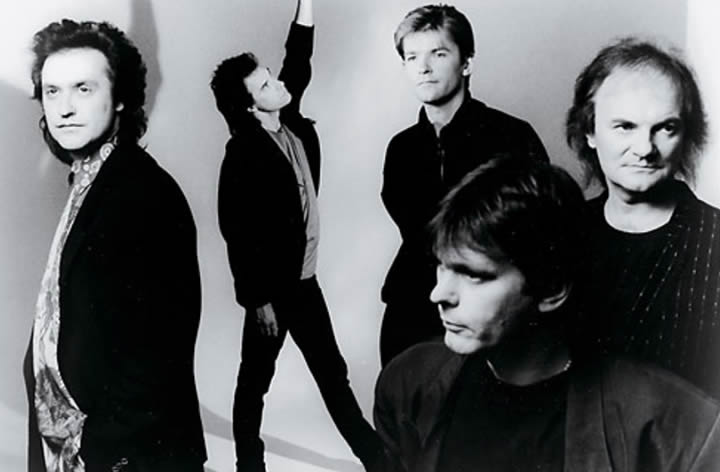State of Confusion by The Kinks
 The Kinks reached the climax of their second major success phase with State of Confusion in 1983. This album comes at the heart of the band’s early eighties “renaissance” when they once again embraced the more direct, straight-forward, “garage rock” sound which the group initially forged in the 1960s. Although this album is not quite as solid as its predecessor, 1981’s Give the People What They Want, it did stick with the same general formula and produced what would become The Kinks’ last batch of charting hits. The album was produced by the band’s lead vocalist, guitarist, and primary songwriter Ray Davies, who was perfecting the post-punk rock sound at the time.
The Kinks reached the climax of their second major success phase with State of Confusion in 1983. This album comes at the heart of the band’s early eighties “renaissance” when they once again embraced the more direct, straight-forward, “garage rock” sound which the group initially forged in the 1960s. Although this album is not quite as solid as its predecessor, 1981’s Give the People What They Want, it did stick with the same general formula and produced what would become The Kinks’ last batch of charting hits. The album was produced by the band’s lead vocalist, guitarist, and primary songwriter Ray Davies, who was perfecting the post-punk rock sound at the time.
Following the success of Give the People What They Want, the band spent the better part of a year touring relentlessly throughout America, England, Australia, and Japan. The climax of this tour was at the US Festival in San Bernardino, California, where the Kinks performed for a crowd of over 200,000.
This was the group’s 19th studio album, a collection which included many works where the band took alternative paths into folk, theatrical, and progressive music. While State of Confusion has a solid rock core, many of those previous styles are reflected in small doses, making for a unique listen. Davies also added just a tad bit more synthesizers and production refinements than on the previous recent albums. Lyrically, the album is filled with mature songs about growing older (Davies was pushing 40 at the time) and many of the issues faced through middle age. Davies, who practically invented and perfected the melodic scream, barely relented musically from his rock core with some minor nods to the music hall influences of his youth.
 State of Confusion by The Kinks |
|
|---|---|
| Released: June 10, 1983 (Arista) Produced by: Ray Davies Recorded: Konk Studios, London, September 1982 – March 1983 |
|
| Side One | Side Two |
| State of Confusion Definite Maybe Labour of Love Come Dancing Property |
Don’t Forget to Dance Young Conservatives Heart of Gold Clichés of the World (B Movie) Bernadette |
| Band Musicians | |
| Ray Davies – Lead Vocals, Guitars, Synthesizers, Piano Dave Davies – Guitars, Vocals Jim Rodford – Bass Ian Gibbons – Keyboards Mick Avory – Drums |
|
Being that the Kinks may very well have been the band that invented punk a decade before its proliferation and the opening title song, “State of Confusion” may be the ultimate post-punk pop song. It begins with choppy, head-banging beat and later contains topical musical melodies (like the spooky sounding synths) and a great bridge with keyboard orchestration and deep harmonies. This first song dually displays Davies production skills as well as his songwriting talent with the lyrics depicting numerous sources of frustrations –
“but back on planet Earth they’ve shattered the illusion, the world’s going around in a state of confusion…”
“Definite Maybe” starts with a deep bass line by Jim Rodford which leads to a unique guitar and piano mix in the strange verse riff which makes this otherwise unfocused song just interesting enough. “Labour of Love” starts with a wailing guitar rendition of “The Wedding March” by Dave Davies. This song’s theme is for marriage what the J. Geils Band’s “Love Stinks” was to love, a scathing indictment.
The album’s biggest hit is “Come Dancing”, which reached the Top 20 in several countries and peaked at #6 in the US, tying it with “Tired of Waiting for You” from 1965 as the band’s highest charting hit. Acoustic built but dominated by a signature organ riff from Ian Gibbons, the composition is a mixture of waltz and early rock and makes for a potent combo. The story-telling lyrics, which sound innocent and happy-go-lucky on the surface, have a much deeper meaning because Davies’ older sister died of heart attack while dancing at a ballroom on Ray Davies’ thirteenth birthday (June 21, 1957) after she surprised him with a gift of a Spanish guitar.
“Property” is driven by the big drum beat of Mick Avory, who along with the Davies brothers is the last remaining founding member of the Kinks. Lyrically, the song is about the somber duty of splitting possessions after a relationship ends. The second side begins with “Don’t Forget to Dance”, an almost a more somber counterpart to “Come Dancing”. This melancholy and moderate pop ballad with slick 1980s production techniques contains interesting changes in key and great guitar technique by Dave Davies during the verses. The song was the band’s final single to make the Top 40 in the US, peaking at #29.

“Young Conservatives” is a brilliant bit of satire with a great vibe, a punk song for the early 1980s. In an ironic twist, the new rebels are the counter-counter-culture in this edgy song with its great compositional structure and excellent bridges. The song references the 1967 song “David Watts” from the album Something Else By the Kinks. “Heart of Gold” is an upbeat acoustic folk song with great chord progressions and twangy lead guitars. Although it is a bit weak lyrically, the music more than makes up for it. The album drifts more towards eighties-type rock in structure and sonic quality for the final two tracks. “Clichés of the World (B Movie)” harkens back to the bands’ mid-1970s theatrical work, while “Bernadette” is a pure rocker, which finishes the album on an upbeat note.
Following the commercial success of State of Confusion, the band’s fortunes began to unravel. Ray Davies started work on a film project which caused tension between the other founding members. Mick Avory left the group halfway through recording the next album, Word of Mouth, released in late 1984. While the Kinks continued to release studio album into the early 1990s, the never again recaptured the popular momentum.
~
Part of Classic Rock Review’s celebration of 1983 albums.




